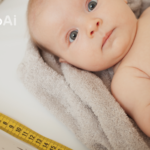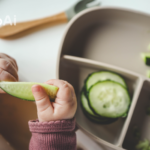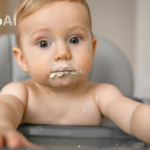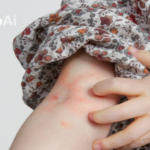When it comes to your baby, their safety is your number one priority. If it is your first child, you may have extra cautious attitudes towards care-taking. Everything we do and all of the products we launch are to help put a parent’s mind at ease and allow them to give their baby that extra care they deserve.
What We Think of when We Think About Baby’s Safety
When we think of a baby’s safety, we tend to recognize physical needs. These can be safety measures such as baby-proofing the house, purchasing a trustworthy car seat, or providing necessities like clothes and shelter. Parents learn fast that certain cries a baby makes mean it needs a diaper change or food. And physical reactions like a fever or cough can trigger a parent to visit the doctor. While physical or visible cues are important and should be prioritized; we also need to think about our baby’s safety in a deeper way. What are the invisible needs we are missing? What else does our child need to feel safe outside of these specific demands? Some needs to ensure our baby feels safe are less obvious. While addressing what you can see is important in maintaining your child’s health, parents also need to look out for the issues that are hidden beneath the surface.
Mental Stimulation
Mental Stimulation is one invisible need of a baby that can cater to its growth and brain development. In a baby’s first year, their brain is developing at a fast rate and their surrounding environment dictates how much they mentally develop. Mental Stimulation can mean different things when it comes to your child. While buying special toys that enhance mental stimulation are great, you are also stimulating your baby’s brain any time you speak, touch, or read to them. Affection is a positive way to build your child’s self-esteem and comfortability.
Emotional and Social Development
When it comes to emotional development, your baby at two months can already express feelings of anger, sadness, surprise, and fear. As your child continues to grow and observe, the more emotions they will exhibit as they become sensitive to other’s moods. At about six months, a baby will mimic what they see their caregiver doing. Babies learn most from watching others. That is why it is important for any parent to teach their baby how to express emotions in a positive way. Show your baby it is healthy to feel things. By the age of two your child will have developed many emotional cues and be able to communicate in a much deeper way.
Babies are social creatures and their social development early on is essential in how they learn to interact with the world around them. Your baby’s first and most important relationship will be with you and your partner. Similar to how you provide your child with emotional development, listening to your baby’s needs, further encouraging language with them, and skin-to-skin contact can all help your baby socially develop. Engaging with your baby by playing games like peek-a-boo or bringing them to day-care with other toddlers can further encourage social engagement. If you already have children, your baby will no doubt learn a lot about social skills through their siblings. It is important to allow your child to explore all kinds of people and relationships in order to learn how they fit in within society and their home.
Physical and Mental Health
While the physical health of your baby can often be seen as a visible need, there are some physical illnesses or disabilities that can render invisible. These needs deserve our attention just as much as the more well-known ones. Since a baby cannot tell us everything, it is our job as parents to pay attention and provide them with the care they need. Knowing your family’s health history and getting your child tested if you are concerned about certain chronic diseases is smart. Moreover, your baby’s mental wellbeing will often be something unseen. Again, if your family has a history of mental illness, it is something to be on the lookout for especially as they get older.
But mental health is not solely about mental illness. Every baby has mental health just like every adult. Providing your child with the necessary care like socializing them, allowing them to explore and be imaginative, or showing them constant love all stem into how they are mentally. While your baby is young, it is never too early to teach them the importance of mental health. Instilling positive coping mechanisms or introducing them to children’s books that discuss mental health can educate them on these issues in simple terms. Being there for your baby is the most influential way to make sure their mental health is taken care of. If a child feels secure in its relationship with its caretaker, it will feel happy. This connection also has long-lasting effects on how your child perceives other relationships in the future.
Food Safety
Food Safety is another need that is often overlooked. However, the health of your baby depends on what is being put into their body. There are some foods that newborns or toddlers cannot eat. A newborn baby is feeding off of formula or breast milk. This in itself is a personal decision for the mother and usually comes down to what is best for the baby’s health. There are many ways to provide these nutrients to your baby and working with your doctor is a great way to figure out what is best for your situation. When a child is closer to four or six months, solid foods begin to be introduced. But still, there are limits on what is safe for a baby to consume. Food Safety can also refer to allergies. If you or your loved ones are severely allergic to a particular food group, it is a good idea to avoid feeding your baby that. Food Safety also has a lot to do with preparation of the food itself.
Breathing Motions
Their breathing is also super important to monitor. If you know the sounds of your baby’s breathing when it is normal, you will be able to more easily detect when something is off. The sound of a baby breathing will often differ from how an adult would for many reasons. So, it is not unusual to hear a baby make strange noises or breath at a fast-pace. However, it is still crucial in case of an emergency situation to know the familiar sound of your child’s breathing. While Sudden Infant Death or SIDS is considered rare and the cause is still unknown, a common possible link is apnea (when your baby has periods of stopped breathing while sleeping). With this fact, being mindful of how your baby’s breathing sounds can keep them safe.
As always, our mission is to give both babies and parents a sense of security in their everyday life. At the end of the day, all of these needs, whether invisible or not, are essential to your child’s safety. While it is easy to acknowledge ways to keep your child safe physically, it is imperative that parents dig deeper into the invisible needs of their little one. And sometimes what we do not see is just as attention-worthy as what is right in front of us.
About the writer

Meghan Nelligan is a freelance writer and creative storyteller based in the United States. She is passionate about mental health, creative writing, and social media. She also manages an Instagram account and a portfolio site for her poetry where she shares weekly readings, personal writings, and favorite works. Check it out here: https://gempoetry.squarespace.com/
You might also like:
- How to Track Your Baby’s Growth: Understanding Height and Weight Development

- Tiny Hands, Big Bites: A Complete Guide to Baby-Led Weaning (BLW)

- Essential Guide to Solid Foods for Baby’s Growth

- Soothe the Scratch! Easing Your Child’s Atopic Dermatitis

- Managing Your Child’s Fever: Simple Tips from a Pediatrician

- How Much Sleep Does Your Baby Actually Need?
